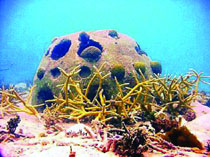For months before Doug Knowlton succumbed to
cancer in August 2003, he had explored various options for his final
resting place.
"His wish was always to be buried at sea," said his
wife, Valerie Knowlton of Cary.
Both husband and wife grew up near
the ocean in Massachusetts and both loved going to the beach.
"That
was the one place he really enjoyed being," she said.
They had
thought the only alternative was to scatter his ashes on the water. But
during his research, Doug Knowlton ran across an Internet site for a
company called Eternal Reefs, based in Atlanta.
He never made a
decision about it before he died. But afterward, Valerie Knowlton began to
look more closely at what the company offered.
On June 14, Doug
Knowlton's ashes will become part of a memorial section of an artificial
reef at the bottom of the ocean off Southport.
"It just seemed like
a good thing to me to be able to do something for the ocean as well as to
fulfill my husband's wishes," Valerie Knowlton said.
It will be the
second such memorial Eternal Reefs has created off the North Carolina
coast, said company founder Don Brawley. The first was about four years
ago off the Outer Banks, he said.
No other company has done this in
North Carolina, said Jim Francesconi, artificial reef coordinator with the
N.C. Division of Marine Fisheries.
Eternal Reefs takes the cremated
remains and mixes them into the concrete as a reef unit is being cast,
Brawley said.
"The remains are truly integrated into the concrete
where it becomes a personal living memorial," he said.
Eternal
Reefs was formed in 1998 as an offshoot of Reef Ball Development Group, a
company that makes and sells concrete balls that are especially designed
to promote marine life growth.
Brawley's father-in-law had come to
him and asked for his remains to be put in one of the reef balls, saying
he'd rather spend eternity with sea life around him than to be buried in a
cemetery. A few months later, when his father-in -law died, the Carlton
Palmer Memorial Reef was cast and put in place off Sarasota,
Fla.
The idea caught on from there, Brawley said.
Many
families prefer the idea of a stationary memorial to that of scattering
ashes, Brawley said.
"A lot of families have trouble doing that
because they feel like they're throwing their loved one away," he
said.
With a memorial reef, families can visit the site by boat,
fish there or even dive there, he said.
The company places a bronze
plaque with the deceased's name on the reef ball. The families can make
etchings of the plaque to keep.
"We'll even let them participate in
the mixing of the concrete," Brawley said. "They can put their handprints
on the top of the memorial."
Cost ranges from $995 for a community
reef ball containing the remains of several people to $4,995 for the
largest individual memorial reef ball, which weighs about 4,000 pounds,
Brawley said.
The cost is in addition to the price of cremation a
funeral home will charge.
The reefs, once placed, become the
property of the state. It is essentially a public reef built with private
money, Brawley said.
Families need not worry that the reef balls
will float away, Brawley said. Since the early 1990s, Reef Ball
Development Group has made thousands of reef balls for artificial reef
sites, he said.
"We've been hit by all kinds of hurricanes in the
Caribbean and everywhere else and we've never had any cases of them
moving," he said.
Francesconi said the state does try to situate
the memorial reefs among others to protect them from commercial trawling,
which is legal in North Carolina waters.
The memorial reef balls
going into the water in June will be part of the Yaupon Beach Reef, a
1,200-by-1,900-foot reef in 30-foot-deep water about 1 fi miles south of
Oak Island, Francesconi said. The site already contains concrete pipe,
bridge remnants and old barge and reef balls.
In deference to the
families, exact coordinates of the memorial reef balls will not be
published, Francesconi said. However, the sites will be open to any of the
public who find them.
Concrete reef balls are an environmentally
sound material for artificial reefs and Reef Ball Development Group has
developed a pH neutral concrete formula that has been approved by the U.S.
Environmental Protection Agency, he said.
The Division of Marine
Fisheries is now completing a three-year study comparing reef balls with
other artificial reef materials.
"They are outstanding,"
Francesconi said.
The state has, in the past, purchased reef balls,
but they are considered a little pricey, Francesconi said. The state
usually looks for free materials to use on artificial reefs, he
said.
For more information on Eternal Reefs, visit
www.eternalreefs.com or call (888) 423-7333.

 |





